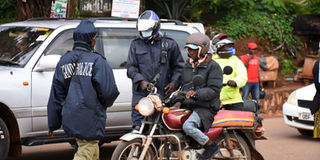Covid-19 turning people’s lives upside down

Police impound a boda boda monocycle after the rider was intercepted carrying a passenger following President Museveni's suspension of public transport. PHOTO BY ALEX ESAGALA
With up to 33 cases confirmed now, coronavirus pandemic continues to sweep through the nation with devastating effect and changing people’s work, way of living and socialisation.
President Museveni’s directives that saw schools closed, public transportation suspended, trade on non-food commodities put on hold, churches and mosques under key and lock, have radically changed people’s lives.
Ms Teddy Nakatto, a primary school teacher in a private school in Nansana, Wakiso District says coronavirus has seen her suffer one of the worst experiences she had ever encountered in life especially after the closure of schools. Ms. Nakatto, a single mother, lives about 3km away from where she used to work. She was earning Shs180,000 a month which, in addition to meeting other needs, she uses to pay rent of Shs80,000 every month.
“The school management gave me Shs50,000 and said that I return to work when government orders reopening of schools,” she says in despair.
“The money I was given was supposed to serve as the last salary I would get from the school to help me pay rent and sustain myself during the pandemic,” Ms Nakatto laments.
Her husband perished in a road accident a year after their first baby was born. She says she has nearly turned into a beggar, a situation she had never contemplated in her life. She lives on the good will of neighbours and friends.
Ms Nakatto carries with her a bottle of hand sanitiser wherever she goes. She bought it at Shs12,000 after the first Covid-19 case was reported.
Another case is James Okello, 36, who had travelled from Lira District to Kampala for a job interview and was successful. He was hired as programme manager for an NGO that supports needy children to study.
He was asked to start work by April 1. He rented a house preparing to start work. However, he received communication from the executive director of his new organisation informing him that they were not sure when or whether work would start anytime soon following increasing Covid-19 cases and government restrictions.
“I have no money left, I had spent everything I had on rent, expecting the benefits when I start working next week to sustain myself,” he told Daily Monitor in an interview on Saturday.
Walking to work
Ms Betty Nabaweesi, a hairdresser, says her salon is in Kasubi, a city suburb. She lives in Masanafu, about 7km away from her workplace. When commuter taxis still operated, she would spend Shs500 to reach her workplace. But government banned public transport on Wednesday following an escalation of the pandemic in the country.
“Today I have decided to walk following suspension of the taxis. I can’t use Uber because they are very expensive. The problem is that some days it is raining and you can’t go. ,” Nabaweesi added.
Dilemma using bicycles
Mr Sam Enasu works in a company that does graphics and provides printing services in Luzira in Kampala. He lives around Naguru, about 10km away from his workplace. Usually, MrEnasu would pay Shs1,000 to reach office by commuter taxi. But when President Museveni suspended public transport, cycling was the feasible alternative and MrEnasu was sure it was a good idea to secure one as soon as possible.
“I bought a nice bike of Shs350,000. But the following day, the downpour was so heavy that my bicycle was rendered useless,” he narrates.




